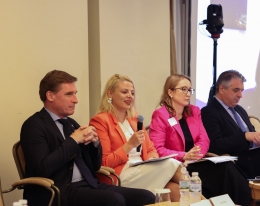European Economic
and Social Committee
Laienemisprotsessis osalevad riigid
Euroopa Majandus- ja Sotsiaalkomitee osaleb aktiivselt ELi laienemisprotsessis ja on töötanud välja paralleelse – piirkondliku ja kahepoolse – lähenemisviisi oma suhete jaoks kodanikuühiskonna organisatsioonidega laienemisprotsessis osalevates riikides.
Seoses piirkondliku lähenemisviisiga on Lääne-Balkani järelevalvekomitee – Euroopa Majandus- ja Sotsiaalkomitee alaline sisene tööorgan – peamine vahend Euroopa Majandus- ja Sotsiaalkomitee tegevuse kooskõlastamiseks selles piirkonnas. Lääne-Balkani kodanikuühiskonna foorum, mida korraldatakse iga kahe aasta järel, on osa järelevalvekomitee tööst.
Euroopa Majandus- ja Sotsiaalkomitee töö Lääne-Balkani riikide ja Türgiga on ka kahepoolne. Et kaasata kodanikuühiskonna organisatsioonid ühinemiseelsesse ja ühinemisprotsessi, on Euroopa Majandus- ja Sotsiaalkomitee loonud riikide ja ELi assotsieerimislepingute alusel kolm ühisorganit kodanikuühiskonna esindajatega – Türgiga, Montenegroga ja Serbiaga. Iga organ koosneb võrdsel arvul liikmetest Euroopa Majandus- ja Sotsiaalkomiteest ja partnerriigist ning koguneb kaks korda aastas.
Selliste laienemisriikide kodanikuühiskonna organisatsioonidega, kellega veel ei ole loodud kodanikuühiskonna esindajate ühisorganit, peab Euroopa Majandus- ja Sotsiaalkomitee korrapärast sidet ja korraldab ühiseid tegevusi.
Ühisorganite tööd täiendab Euroopa Majandus- ja Sotsiaalkomitee arvamuste koostamine konkreetsete riikide ühinemiseelse ja ühinemisprotsessi kohta ning samuti piirkondlikku huvi pakkuvate teemade kohta.









